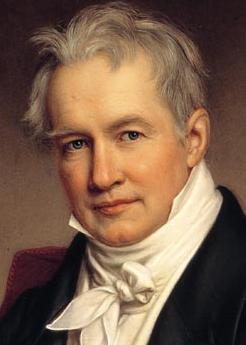Humboldt, Alexander Freiherr von *
Alexander Freiherr von Humboldt (1769-1859) was a renowned German scientist and explorer. He spent five years (1799-1804) on an expedition to South America. While there he discovered the Casiquiare River, which links the Amazon and Orinoco rivers.
Humboldt expressed the view that Atlantis had possibly been located in America, although in his 1814 book, Personal Narrative of Travels[1329.v1.201], he stated that he did “not intend to form any opinion in favour of the existence of the Atlantis.” 
Humboldt also considered the likelihood of ancient links between Europe and the Americas, pointing out remarkable similarities between the Nahuatl and Greek languages. An example of which is the Aztecan Nahuatl language’s teo-cali (god’s house) and the Greek theoukalia (shrine or god’s house).
Furthermore, Humboldt also claimed that the Mayan and ancient Chinese calendars had a common source, an idea adopted by David H. Kelley in a paper written decades ago, but only recently published in the journal Pre-Columbiana. A review of his work by Tara MacIsaac in Epoch Times(b) should also be read. Jason Colavito has offered a sceptical view of that claim(a).
However, Galanopoulos and Bacon assert[263.96] that Humboldt favoured a Mediterranean inspiration for the Atlantis drama.
(b) Mayan Calendar Similar to Ancient Chinese: Early Contact? (archive.org) *
